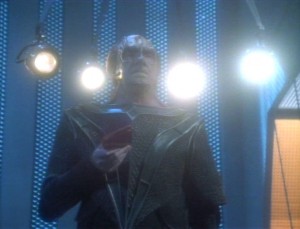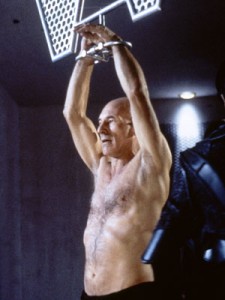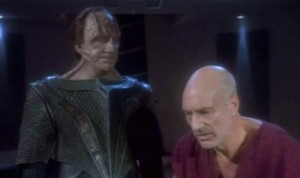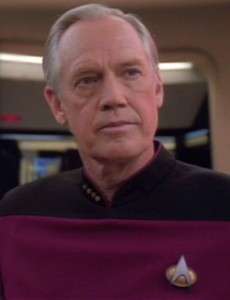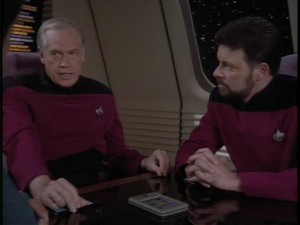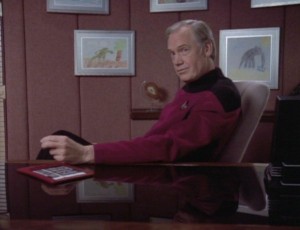This is the fourth entry in my “Top Ten Star Trek: The Next Generation” episodes.
How many lights do you see??
Brief synopsis of this episode is that Captain Picard is lured off the ship on a spy mission, leaving another captain in command of the Enterprise, Captain Jellico. Why they couldn’t just get Commander Riker to take the big chair, especially when it’s been offered to him and filled by him in the past is beyond me.
Anyway, Picard gets captured and is then tortured and humiliated by the Cardassians while Captain Jellico unleashes his own reign of terror on the Enterprise.
“Chain of Command” was an episode I had heard a lot about but never saw until I did this marathon watch. If I had to pick one episode of Star Trek: The Next Generation that I thought everyone should see, this would be it. (Yes, I am aware of the fact that this has two parts, but I am treating it like one cohesive whole.)
There Are Four Lights!
Captain Picard has had some really terrible luck as the captain of the Enterprise. He was assimilated by the Borg and then this happens.
I honestly don’t remember what the purpose of the torture was or why Captain Picard was targeted for torture because it genuinely doesn’t matter.
Over the years Picard has become synonymous with the ideal leader. We have Picard Management tips on Twitter for a reason. Everyone wants to have a boss/mentor like Picard.
It is seemingly simple. All Picard has to do is tell the Cardassian torturing him that there are five lights when there are clearly only four. Picard can’t do it. He knows that if he capitulates to the Cardassian and tells him something they both know isn’t true that he will lose a part of himself. He will show that he can be broken and submit his will to someone else.
This is a power struggle. As long as Picard can hold fast to his version of reality he has power. The second he says there are five lights the game is over. Picard will have lost any power he has. It might seem strange to say that a man who is stripped of his clothing and tortured has any power, but that is not the case. He has not allowed the Cardassian to corrupt his reality and that means something.
The technique used to break Picard is known as “Gaslighting”. The term comes from an Alfred Hitchcock film of the same name about a woman who is made to feel that she is going insane. Gaslighting is most commonly associated with women in abusive relationships. One reason it is so pervasive in those situations is partially based on cultural bias. We readily believe that women are crazy. Think about how many men talk about their “crazy” ex. It is very easy to ruin a woman’s personal and professional reputation by spreading rumors that the woman is crazy and to do things to her to make her question her own perception of reality.
I have been on the receiving end of gaslighting and it is a terrible experience. You feel like you don’t have a grasp of your own reality. It is a terrible thing to do to another human being.
It is wrenching to see this magnificent leader in the process of being broken. It is so meaningless and cruel. It also shows that as capable and impressive as Picard is, he is a human being. He had tremendous strength which allows him to survive through the initial punishment.
He is rescued before he breaks under the pressure, but I think it speaks volumes that when he is speaking with Troi at the end of the episode that he started to question his sanity and started to wonder if there were in fact five lights. The fact that this rock-solid, impressive character admits that he not only nearly broke, but actually started to question his own sanity is such a huge thing.
Captain Jellico
Oh. My. God. I don’t think there are words to describe how much I hate this fucking asshole. If Captain Picard is the boss we all wish we had, Captain Jellico is the composite of all the worst bosses we’ve ever actually had.
The first thing he does when he come aboard is he disrupts the flow of the ship. He orders Riker to reconfigure all the work shifts and since he only has two hours he better get cracking. There was a reason the ship was not following that particular type of schedule but rather than find out why he disrupted the routine of everyone on the ship.
It is important to be able to go along with change, but if you are doing things that disrupt vital ship functions and places the ship in danger just to play musical chairs is really stupid. How difficult would it have been to give them until they created the next shift schedule to implement the change? I guess this is indicative that labor unions are dead in the twenty-fourth century.
Anyway, making meaningless disruptive change is stupid.
Captain Jellico also does the classic management thing where he manages upward. That means that he doesn’t really try to nurture or manage the people under his command. He honestly doesn’t give a damn about them as people. He just wants to snap his fingers and get them to jump. I think one reason Picard has been seen as a paragon of management is because he actively worked with his crew to try and push them to do better. Many people in management only worry about cultivating relationships upward for advancement without really caring about or noticing the people under them.
When I used to do radio news I really wanted to be a producer. My producer was a very unpleasant human being and I wanted to be in charge. I was briefly given a producer job on the Wednesday night newscast.
We had a live interview fall through and we needed to move on to the next story. I wrote this information down and gave it to the anchor. She took the piece of paper and set it aside without reading it.
She did the intro for the interview and did her, “And now speaking with us about this is our guest I-Forgot-His-Name. Hello. Hello??”
I ran in and picked up the piece of paper and held it in front of her face to get her to read it. She looked at it and went back to the microphone and said, “Oh, it looks like we aren’t going to talk to I-Forgot-His-Name. Our producer screwed up the interview and we have to move on.”
I can not tell you how deeply angry and powerless I felt at that moment. I could not believe the lack of professionalism this person displayed. I also couldn’t do anything about it. I couldn’t just jump on a microphone and tell everyone that I told her about this but she didn’t read the note and so she was the one that screwed up.
As unpleasant as my news producer was, there was no fucking way anyone would pull something like that on her. It would not occur to anyone to even try it. She would make your life not worth living if you even thought about pulling that crap on her.
The moral of this story (and how it relates to this episode) is that you can’t just put a person in charge and expect everyone to do what they say. There is a difference between a boss and a leader.
Captain Jellico’s attitude seemed very similar to the one I had before becoming a producer. I assumed that since I was in charge people would do what I say. I was wrong. If people don’t respect you or don’t think you are strong enough to follow through on things you will either get mowed over or you will earn the eternal hatred of everyone underneath you.
I think it is possible to cultivate leadership, but I also think some people are born with a natural proclivity for it. Some people don’t. I don’t. I could spend a bunch of time cultivating it, but honestly, it really isn’t that important to me. I would rather focus my time and energy on other things.
Conclusion
This was a powerful and complex episode of Star Trek. I kind of took Captain Picard for granted before this episode. I am looking forward to going back and watching previous episodes to marvel at how well he leads the crew.
The way the writers constructed Captain Jellico was perfect. He wasn’t overly exaggerated and he was seen less as an evil person and more as a misguided person who was out of his depth. If he wasn’t such a prick I would almost feel sorry for him.
Star Trek episodes occasionally lack subtlety and will beat the viewer over the head with whatever message they want to convey, like the terrible first season conversation between Tasha Yar and Wesley Crusher about drug addiction. All of the characters in this episode showed sufficient complexity and human ambiguity. They tackled a difficult subject and did credit to it. Kudos.
